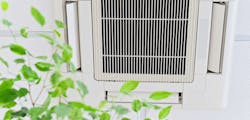Balancing Clean Air and Reopening Amid New COVID-19 Indoor Air Guidelines
With guidelines from the commercial building industry, US EPA Energy Star program, and ASHRAE —
In the aftermath of sweeping stay-at-home orders and a several-months shutdown of many businesses, life in a post-COVID world is going through a new normal — a different way of doing things than were done in the past. With a wide range of challenges facing commercial building owners as a result of the coronavirus, the heating, ventilation, and air conditioning (HVAC) and related industries are no exception.
COVID-19 has shined a spotlight on indoor air quality and ventilation. It seems clear that business owners, employees, and customers with chronic respiratory illnesses like asthma, COPD, and emphysema all benefit from improved indoor air quality and whole building ventilation. This is true even outside of the flu and respiratory illness season.
Short and long-term exposure to any poor air quality can not only cause exacerbations of chronic respiratory illness and reduce lung function, these same factors have been associated with increased severity of COVID-19 pneumonia and increased risk of contracting airborne illnesses in people both with and people WITHOUT chronic respiratory illnesses.
As a result of these factors relating to COVID concerns, experts from the commercial building industry, US EPA Energy Star program, and American Society of Heating, Refrigeration, Air-conditioning Engineers (ASHRAE) met recently to discuss how to best operate HVAC and related systems, and to offer recommendations on Building HVAC Operations amid COVID-19.
Leading takeaways from the nearly 3-hour program and Q&A included:
Stressing the necessity of new cleaning protocols and low-cost building upgrades
Property management experts have already instituted a wide range of changes to their buildings, including:
- Posting signage and messaging with CDC guidelines in common areas, break rooms, bathrooms, and conference rooms.
- Defining travel patterns within the tenants’ space.
- Limiting conference room capacity.
- Bringing in additional outside air and replacing filters with more efficient MERV 13 filters.
- Placing greater emphasis on cleaning high-touch surfaces including doorknobs and elevator buttons.
- Providing disinfectant wipes and hand sanitizer stations in lobbies.
Observing that business owners have taken it upon themselves to:
- Devise new seating arrangements.
- Install shields between tables that face each other.
- Require employees and customers to check their temperature upon arrival.
- Install automated fixtures in restrooms.
While emphasizing it’s still necessary to prepare buildings for coming standards:
Some essential tips from ASHRAE to prepare buildings for occupancy re-entry:
- Flush the air and water systems.
- Assess air filtration systems.
- Ensure that HVAC systems undergo maintenance, cleaning and are operating normally.
- Install a SMART whole building ventilation controller system.
Various chemicals may abound within a business. These range from employee and customer personal care products such as cosmetics, perfume and hair care products, to sources of fossil fuel heat. In addition, many cleaning agents, radon, humidity, and mold can add to respiratory burdens.
Experts recommend using simple measures to decrease exposure to air pollutants such as:
- Cleaning.
- Not allowing smoking.
- Using dehumidifiers in high-humidity areas.
- Installing carbon monoxide and radon monitors.
- Ensuring adequate ventilation through air exchange options.
InvisiLight® Solution for Deploying Fiber
April 2, 2022Go to Market Faster. Speed up Network Deployment
April 2, 2022Episode 10: Fiber Optic Closure Specs Explained…
April 1, 2022Food for Thought from Our 2022 ICT Visionaries
April 1, 2022Offering technical guidance on changes to HVAC systems
In examining research from ASHRAE, CDC, WHO, and OSHA. among others, the experts found that:
1. HVAC is not a major transmitter of viruses including COVID-19; transmission is mainly from person-to-person close contact over extended periods. However, since many viruses, including COVID-19, are spread by airborne transmission, HVAC measures should be taken to reduce potential exposure.
2. HVAC can help prevent the spread of COVID-19 by incorporating evolving best practices that focus on SMART whole building ventilation in order to dilute airborne viruses and filtration to remove dust and airborne particulates. This can be accomplished by:
- a) Increasing whole building ventilation using SMART ventilations controllers that compare indoor and outdoor air quality, control outdoor air intake to prevent mold growth while maintaining minimum outside air flow to reduce the risk of airborne illness transmission.
- b) Improving filtration to MERV-13 or the highest efficiency level feasible, and ensuring that filters are sealed properly to prevent bypass.
- c) Using SMART whole building ventilations controllers to provide outside air for several hours both before and after occupancy each day.
- d) Consider adding UV sanitizers to the HVAC system as a secondary method to the fundamental measures listed above.
Pointing out that post-COVID-19 ventilation standards will increase energy usage (though not cost) with a SMART controller:
Experts analyzed the energy use impact of 3 measures to reduce virus transmission risk and recommended:
- Extending HVAC hours to provide additional outside air for several hours both before and after occupancy each day.
- Upgrading to MERV 13 from MERV 8 filters.
- Letting in an additional 50% outside air above minimum standards.
Experts found that these changes would result in a 3% to 5% increase in building energy usage, depending on the climate and region. SMART whole building ventilation controllers, however, yield up to 30% energy savings.
Therefore, implementing new post-COVID-19 ventilation standards with a SMART whole building ventilation controller will still yield a net energy savings.
Summary
With a professionally installed whole building ventilation and annual maintenance, any HVAC system can and will remove airborne viruses and other indoor pollutants before they impact the health of employees, customers, and families.
Health measures have never been more important than in a post-COVID 19 world.
About the Author: Mona Kelley, RN, MSN is Managing Member & Regulatory Affairs Specialist with the Lake Wales, FL-based Natural Air E-Controls, LLC (www.naturalair.com). Natural Air E-Controls, LLC designs and builds HVAC control systems that enable the building’s HVAC equipment to provide fresh air and remove pollutants by taking in outdoor air in amounts needed to improve indoor air quality while saving on heating and cooling bills.




